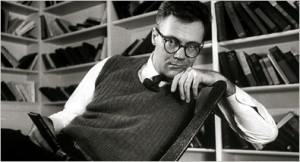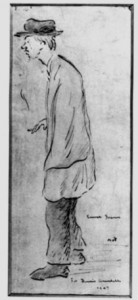 Mrs. T and I are staying at an inn that overlooks Maine’s Penobscot Bay. Our purpose in coming here was to relax, eat lobster, and find the perfect dinner table, and so far we’ve done well on all three counts. On Sunday, though, the skies turned forbiddingly gray, forcing us to retreat to our room to escape a fast-approaching shower. While Mrs. T took an afternoon nap, I sought other amusement, reveling in the chaud-froid sensation of sitting in an outdoor hot tub on a cool, drizzly day and paying a visit to the inn’s library.
Mrs. T and I are staying at an inn that overlooks Maine’s Penobscot Bay. Our purpose in coming here was to relax, eat lobster, and find the perfect dinner table, and so far we’ve done well on all three counts. On Sunday, though, the skies turned forbiddingly gray, forcing us to retreat to our room to escape a fast-approaching shower. While Mrs. T took an afternoon nap, I sought other amusement, reveling in the chaud-froid sensation of sitting in an outdoor hot tub on a cool, drizzly day and paying a visit to the inn’s library.
I always enjoy looking over the unwanted books that end up on the shelves of hotels and (once in a while) restaurants. Like most such collections, this one is a random assemblage of more than usually miscellaneous volumes, presumably purchased by the foot, in which moldering bestsellers by Jackie Collins, Garrison Keillor, and Kathleen Norris are shelved alongside musty works of nonfiction that were surely forgotten within minutes of their publication. But I did run across a mystery novel by a friend of mine—the first time I’ve ever found a book in a hotel library that was written by a person I know—and, even more surprisingly, a paperback copy of Selected Poems of Robert Lowell.
 I wonder who reads Robert Lowell nowadays. He used to be a very big name in the very small world of modern poetry, and for all I know he still is, but it’s not my impression that he gets taught or talked about all that much anymore. I can only quote one sentence of his from memory, the opening of “Falling Asleep over the Aeneid,” which I know because it was reprinted in one of Oscar Williams’ now-forgotten anthologies of American verse: The sun is blue and scarlet on my page, /And yuck-a, yuck-a, yuck-a, yuck-a, rage/The yellowhammers mating. Not much of a monument, that.
I wonder who reads Robert Lowell nowadays. He used to be a very big name in the very small world of modern poetry, and for all I know he still is, but it’s not my impression that he gets taught or talked about all that much anymore. I can only quote one sentence of his from memory, the opening of “Falling Asleep over the Aeneid,” which I know because it was reprinted in one of Oscar Williams’ now-forgotten anthologies of American verse: The sun is blue and scarlet on my page, /And yuck-a, yuck-a, yuck-a, yuck-a, rage/The yellowhammers mating. Not much of a monument, that.
It happens that I did think of Lowell briefly a few months ago, but that was only because I had occasion to make passing mention of him in an essay about Norman Mailer, another American writer whose reputation isn’t exactly what it used to be:
Mailer understood that his journalistic career was at best a lucrative sidetrack. In The Armies of the Night he reports a conversation in which the poet Robert Lowell told him that he was “the best journalist in America,” to which Mailer retorted that “there are days when I think of myself as being the best writer in America.” Taking the point, Lowell added, “Oh, Norman, oh, certainly, I didn’t mean to imply, heavens no, it’s just that I have such respect for journalism.” And once again Mailer—at least by his own account—topped Lowell, replying, “Well, I don’t know that I do.”
Note, by the way, that I took care to refer to him as “the poet Robert Lowell.” I wouldn’t have felt the need to identify him twenty-five years ago. The mere mention of his name would have sufficed. Now he belongs to the ages, and the ages, it appears, have relegated him to the shelf of a seaside hotel library. If there’s a bleaker tribute to the vanity of human wishes, I’d be hard pressed to think of it. Were I a poet, I might consider writing an “Ode to a Book Found in a Hotel Library,” except that Dr. Johnson, in a manner of speaking, did it for me.
 And if it is the fate of the likes of Lowell and Mailer to be forgotten, then what of me? About that I have no doubt at all: I’ll be lucky, like Max Beerbohm’s Enoch Soames, to make it into a footnote. Nor does that prospect upset me in the least. No sooner did I put Selected Poems of Robert Lowell back on its shelf than I took Mrs. T out to dinner, where we had the best restaurant meal that either of us has ever eaten. As we drove home afterward, our bellies full and our hearts light, I reminded myself that there is nothing more fleeting than the art of a great chef, and remembered that no less a creative giant than George Balanchine compared his ballets to butterflies: “A breath, a memory, then gone.”
And if it is the fate of the likes of Lowell and Mailer to be forgotten, then what of me? About that I have no doubt at all: I’ll be lucky, like Max Beerbohm’s Enoch Soames, to make it into a footnote. Nor does that prospect upset me in the least. No sooner did I put Selected Poems of Robert Lowell back on its shelf than I took Mrs. T out to dinner, where we had the best restaurant meal that either of us has ever eaten. As we drove home afterward, our bellies full and our hearts light, I reminded myself that there is nothing more fleeting than the art of a great chef, and remembered that no less a creative giant than George Balanchine compared his ballets to butterflies: “A breath, a memory, then gone.”
If the greatest choreographer of all time could say such a thing—and mean it—about his masterpieces, then who am I to expect more from posterity? Perhaps a copy of Pops or Duke or The Skeptic will eventually find its way to the shelf of a hotel library on the coast of Maine, there to gather dust, and perhaps a guest will pick it up someday and say, “You know, this is a pretty good book. I wonder who that Teachout fellow was? Now, where shall we go for dinner?” I can think of far worse fates.
